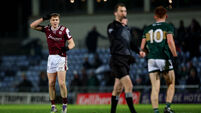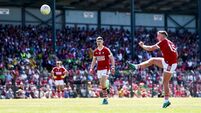Carson a true reader of the game

Ciaran Carson did, though. The Belfast native has collected poetry prizes over four decades but in the 1960s, he was a marauding forward in saffron and white.
“I was slightly unusual in that I was a reader and was seen as slightly odd on the team,” he recalls now. “To be honest, in terms of the team I didn’t care as long as I played okay. I was skilful, quick, played right-half forward or corner forward. Get a few points out on the wing, which I saw as, strangely, a skill on its own, rather than interacting with the rest of the team.”













